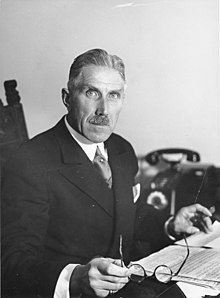Office of the Deputy Chancellor

The Office of the Deputy Chancellor (Vice Chancellery von Papen ) was a supreme Reich authority that existed from May 1933 to July and September 1934, respectively.
history
Until 1933 the office of Vice Chancellor in the German Reich was always held in personal union by a member of the Reich Cabinet, which as a specialist minister also headed a regular department. As a result, the German Vice Chancellors always left their official business as deputy head of government in their relevant ministry.
With the appointment of Franz von Papen as Vice Chancellor in the Hitler government on January 30, 1933, a person was appointed as Deputy Chancellor for the first time who was not also head of a specialist government department and was thus able to dispose of the apparatus of the associated ministry for the tasks of the Vice Chancellor. Papen had initially compensated for this by having his vice-chancellor's business overseen by the employees of the Prussian State Ministry , which was subordinate to him in his capacity as Reich Commissioner for the State of Prussia , to which he had been appointed Deputy Chancellor in the Reich Cabinet at the same time as his appointment.
After Hermann Göring took over the re-established office of the Prussian Prime Minister in April 1933, the Reich Commissariat for Prussia was extinguished, which meant that Papen lost the opportunity to dispose of the State Ministry's apparatus; Control of the State Ministry and its employees was now passed to Göring.

Since the situation arose here for the first time in the history of the German Reich that the Vice Chancellor was not at the same time the master of a further office and thus automatically had an apparatus that could take over the tasks incidental to him as Vice Chancellor, a decision of the Reich Cabinet created the “Office of the Deputy Chancellor” in May 1933 as an independent “Ministry of the Vice Chancellor”. As an administrative office with the rank of the highest Reich authority, the office managed the official business of the Vice Chancellor from then on.
The so-called Palais Borsig , right next to the Reich Chancellery , on the corner of Wilhelmstrasse and Vossstrasse , where the Prussian Pfandbrief bank had been located until then, was chosen as the service building for the office of the Deputy Chancellor .
After there was considerable tension in the early summer of 1934 between Papen as an exponent of the conservative government wing in the initial phase of the Hitler government and the National Socialist leadership, Adolf Hitler took the opportunity of the political cleansing on June 30, 1934 ( Röhm Putsch ) to address the To have the office of the Deputy Chancellor liquidated: On this day an SS commando occupied the office of the Vice Chancellor, whereby his colleague Herbert von Bose was shot and three others were taken to the Lichtenburg concentration camp . After the Vice Chancellery was abolished in July 1934 (which, for tactical reasons, was only made public a few months later), the office of the Deputy Chancellor's office was dissolved as a ministry from July to September 1934: business was initially carried out on a temporary basis by a winding-up office, the was first in Potsdamer Strasse and finally in Mohrenstrasse , continued and then discontinued.
literature
- André Postert : The end of conservative ambitions. Franz von Papen and the Vice Chancellery in the summer of 1934 . In: Historisches Jahrbuch, Vol. 134, Münster 2014, pp. 340–371.
- Rainer Orth : "The official seat of the opposition" ?: Politics and state restructuring plans in the office of the Deputy Chancellor in the years 1933-1934 . Böhlau, Cologne 2016. ISBN 3412505552
- Thomas Trumpp : Deputy Chancellor (Vice Chancellery von Papen) (= finding aids of the Federal Archives, Vol. 2). Koblenz 1985.